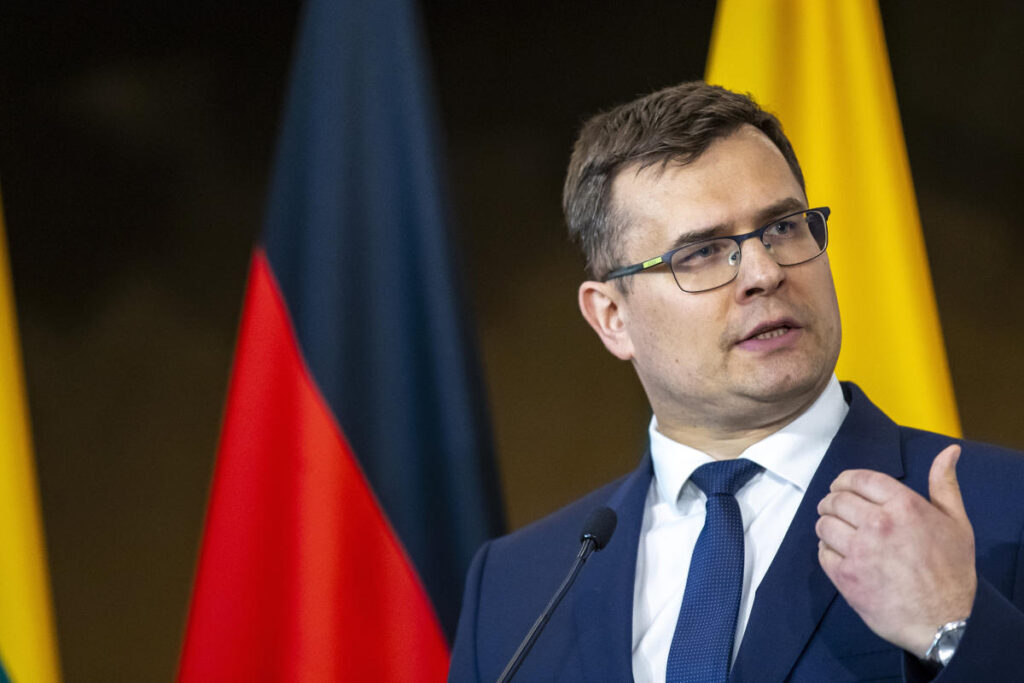In light of the upcoming presidency of Donald Trump, Lithuania’s defense minister, Laurynas Kasčiūnas, emphasized the importance of European nations adopting a cooperative stance rather than creating a division or barrier between themselves and the new U.S. leader. During a recent gathering in Prague focused on European and transatlantic military capabilities, Kasčiūnas underscored that European nations should acknowledge Trump’s approach to international relations, which he characterized as a “contractual” style. He suggested that Europe should strategically identify and address common issues where collaboration could be beneficial, including increased defense investment, European acquisitions of American military hardware, and cooperation in countering threats posed by China and Iran.
Historically, during Trump’s first term from 2017 to 2021, he pressured NATO allies to contribute more financially towards defense, specifically targeting the goal of at least 2% of their gross domestic product. This call for increased defense spending seemed to resonate well with many European nations; as a result, in the current year, 23 NATO member states are expected to meet or exceed that 2% target, a significant rise from only three nations a decade ago. Lithuania has taken a particularly aggressive stance, surpassing a 2.5% defense budget in a bid to eventually reach 4%, figures that would exceed U.S. spending levels. There has also been a notable resurgence in Europe’s defense industry, particularly following Russia’s all-out invasion of Ukraine, which has driven many countries to boost their military production and support for Ukraine amid an environment of enhanced geopolitical tension.
Despite these advancements, Kasčiūnas pointed out that European nations still heavily rely on the United States for certain critical military capabilities, particularly in the context of the ongoing conflict in Ukraine. As the largest importer of U.S. arms among the Baltic states, Lithuania plays a crucial role in fortifying regional defense strategies. The role of arms and military support is not just theoretical; countries have actively provided military assistance to Ukraine while acknowledging their own dependencies, revealing a complex intertwining of regional defense cooperation and transatlantic relations. In addition to military concerns, Kasčiūnas highlighted Lithuania’s diplomatic maneuvers, such as its confrontations with China regarding Taiwan, and he supported the European Union’s imposition of sanctions against Iran as preventive measures against potential aggression.
The ongoing war in Ukraine, exacerbated by Russia’s military actions, presents a complex challenge for European unity and response strategies. Kasčiūnas expressed concern regarding Trump’s historical critiques of U.S. aid to Ukraine, noting that Trump’s ambiguous messaging concerning the continuation of support could disrupt the coordinated effort to deter Russian aggression. During discussions surrounding potential cease-fire arrangements, Kasčiūnas asserted that any terms dictated by Russia would be unacceptable, warning that limited cease-fires might only serve to allow Russian forces to regroup and launch renewed offensives. He called for a durable and just resolution to the conflict that would not enable further aggression from Russia.
In the midst of Trump’s impending presidency, European nations face a challenging landscape that includes the balancing act of maintaining unity within the transatlantic alliance, responding effectively to Russian incursions, and addressing rising tensions with other global powers, notably China and Iran. Trump’s previous threats, such as a trade war with the EU or withdrawing U.S. commitments to NATO, underline the urgency for European nations to swiftly adapt their defense and foreign policies. Kasčiūnas and other European leaders will need to navigate these complex dynamics prudently, fostering partnerships where possible while preparing for a range of potential outcomes based on Trump’s presidency.
Ultimately, the message from Lithuania’s defense minister serves as a call for pragmatism and foresight in the face of an uncertain geopolitical climate. By reframing the relationship with Trump as one of engagement rather than opposition, Kasčiūnas hopes to facilitate a more constructive dialogue around European defense initiatives and transatlantic cooperation. The shifting landscape of global politics necessitates that European nations put aside past grievances and work collaboratively to not only bolster their own security but also to contribute to a united front against emerging threats. In this context, the future of transatlantic relations holds critical implications for both European security and broader international stability.

